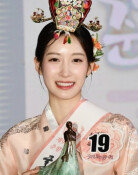11 Western-style Markets Being Constructed in Pyongyang
11 Western-style Markets Being Constructed in Pyongyang
Posted August. 06, 2003 21:25,
"Chairman Chung Mong-hun visited us, so the grand opening ceremony for Chung Joo-young Stadium, which is slated for this September, will probably be held grandiosely. Seeing Chairman Chung crossing the demilitarized zone, along with 1,000 delegates, feels better than his father`s crossing the same area with a herd of cows, doesn`t it?"
On the first day of my arrival in Pyongyang on July 28, a North Korean guide said that the regime had great expectations for Chairman Chung, who had already returned to the South on July 25 after staying there for two days. Unfortunately, now Chairman Chung is no longer with us.
The Stadium I passed by while taking a tour of Pyongyang by car appeared immaculate and ready for the ceremony.
▽ State-run stores supplementing the general market = In an ambivalent feeling of expectation and disappointment for the economic exchange with the South, the North seemed like it was quietly making progress in its economic reformation. The general market symbolizes the reform.
"In the old days, Songshin Farmers` Market was the biggest. In the near future, a bigger market will come about. 11 modernized markets are being built in Pyongyang. When completed within this year, I will show you them."
A North Korean guide made this promise without any hesitation upon receipt of the request to show us the markets. Pyongyang looked different. It was not the city I saw last June nor was it the city I saw last year in November. Changmadang had been off-limits to visitors from the South then. Believing that its existence contradicts the socialist market system of the North, its officials had even denied its existence.
The guide kindly explained, Unlike Changmadang, the government does not interfere in the transactions conducted in general markets. The general markets are open seven days a week.
The core of the economic reform lies in the idea that the market determines the flow of products that the state cannot provide to its people.
North Korea argues that its adoption of the market economy system does not prove the failure of its brand of socialism; rather, the North has adopted the system just to supplement the problems arising out of this type of socialism.
▽ Building renovation boom and People`s Public Bond = Unlike last year, when only Pyongyang had building projects underway, now there renovation and construction of buildings can be seen all over the place, even in other cities, but especially on Glory Street, which is located in front of Pyongyang Station Plaza. A large-scale repair job was under way there.
All these public works indicate the improving economic power of the North. One guide said, The government has raised hundreds of billions of won by issuing and selling a national bond to people since May 1. Its par value is 2,000 won, and it uses the fund to finance various construction projects."
Kim Kee-sam, a Pyongyang resident whom I met July 30 in Pyongyang, said, My wife and I bought 30,000 won worth of the bond. In September, the government plans to pick out some holders by lot and pay them some prize money. But, I bought it for our country. I don`t want anything in return.
On appearance, the government does not force its people to buy the bond. However, the regime encourages them to buy it by giving special citations and holidays to those who purchase it in large quantity.
▽ Improvement in power supply = Looking at the streets in Pyongyang at night from the top of Korea Hotel, I could easily see that the power supply in the city has been improving.
Also, more trains were running through Pyongyang Station, and there was no sudden stoppage of elevators at the Chooche Tower.
"We are continuously constructing 5000 kW medium-sized power plants. Moreover, we had more rain this summer, and could generate more electricity," confirmed a North Korean official. "After the July 1 economic improvement measures, we have produced more coal, and also generated more electricity with it."
Still, shortage of electricity hinders the economic recovery of the North. North Korea has the capacity of generating 7,000,000 kW a year. Due to the lack of fuel and deteriorating facilities, however, it has to settle for mere generation of 2,000,000 kW.
▽ Inconvenience from simultaneously using euro and dollar = Last October, North Korea announced that it would use only the euro. The measure has two goals: to cope with the economic embargo imposed by the United States, and to absorb the dollars sleeping in the safes of individual North Koreans.
In converting dollars into euros, the North Korean government applies the 1:1 exchange rate, instead of enforcing the market rate of one dollar against 0.85 euro. As a result, people end up paying 15% more than they should.
For example, enjoying a sauna at the Korea Hotel cost three dollars last September. Now, it costs three euros, which, in dollar terms, amounts to $3.50.
A North Korean guide explained, "We have to use the euro. America has suppressed us economically. When America lifts its embargo, we can go back to the old days."
skysung@empal.com







